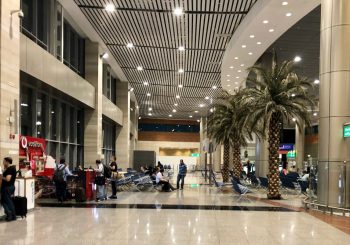Amassing a wealth of EGP 5.7 billion (USD 7 billion at the time) during his peak in 1986, Ahmed Al-Rayan was an Egyptian conman so notorious that a television series centered around his upbringing, businesses, and crimes.
That wealth is equivalent to almost 20 percent of Egypt’s entire GDP during that year. Al-Rayan was only 30 years old at the time.
In the United States, two decades after Al-Rayan’s Ponzi scheme, Bernie Madoff shocked Wall Street with a major USD 64 billion fraud case in 2008.
Once the chairman of America’s NASDAQ stock market, Madoff built a Ponzi empire that stole from the likes of famed director Steven Spielberg, and actors like John Malkovich and Kevin Bacon.
Americans of that era still remember the impact Madoff’s fraud had on the American economy.
To the Egyptians of Al-Rayan’s era, his Ponzi scheme not only left a staggering toll on the economy – it forever reshaped the Egyptian government as well.
HOW AL-RAYAN’S PONZI BUSINESS HAPPENED
A Ponzi scheme can be defined as a fraudulent investment operation that promises fast, easy, and lucrative returns on investments with barely any risks. These schemes trick thousands into investing their money, sometimes their savings, never seeing a return on their investment ever again.
In Egypt’s case, Al-Rayan was the leader behind a decade of fraudulent operations.
And Al-Rayan always had an eye for business opportunities and financial gains far before his Ponzi scheme. More specifically, he always had an eye for money.
As a child, he explored a wide variety of business ideas, ranging from wooden medallions with calligraphy engravings to printed school notes.
However, Al-Rayan’s fraudulent financial behavior really took off during early adulthood, when his older brother’s – a contractor – client wanted to exchange 100 Kuwaiti Dinars to Egyptian Pounds.
Al-Rayan succeeded in exchanging the currency, and at a higher price than what banks offered during that time although this was a criminal offense. Al-Rayan continued with his illegal exchange business, earning EGP 50,000 a day.
A few years later, in 1981, Al-Rayan established the private investment fund ‘Al-Rayan for Investments’ in partnership with his brother. Al-Rayan’s company promised Egyptians the chance to invest their money in his fund with 20 to 25 percent interest. Akin to his exchange rate business, these rates were far greater than bank standards which were 13 percent at the time.
His company took investments, from both poor and rich, and re-invested that money in his portfolio of businesses. These businesses were far and plenty, ranging from contracting to fridge-making, as he promised investors exorbitant returns based on the profits generated from his businesses.
Al-Rayan’s financial gains were unprecedented at the time. Egypt’s existing investment law of 1974 had no articles that addressed what was a predominantly unexplored form of investment fraud.
The conman capitalized on Egypt’s economic troubles at the time – troubles that placed it as the most indebted country in terms of foreign debt in 1986. Trust in the state and banks were at an all-time low as citizens sought alternative means to invest in their assets.
Al-Rayan’s financial strengths grew to such an extent that he attempted to acquire majority shares in the Bank of America during the 1980s.
In an interview with journalist Amr Adeeb in 2011, Al-Rayan alleges that the purchase was approved by the United States but rejected by Egypt’s Central Bank. In that same interview, he claims that Gamal Mubarak, son of ousted President Hosni Mubarak, was his competitor in the acquisition and the main reason behind the rejection.
1986 was also the year the government also fell folly for Al-Rayan’s financial influence. As Egypt struggled to reach a loan deal with the International Monetary Fund, the government sought Al-Rayan’s financial assistance to import yellow corn due to an increasing shortage.
The deal, however, was a catastrophe as the required corn imports were not met and the country fell into a corn shortage crisis.
Egypt’s Development and Agricultural Credit Bank reached a deal worth USD 50 million according to Al-Rayan in the same interview with Amr Adeeb, and his money was never returned to him.
This was Al-Rayan’s first deal with the government. It was also the beginning of his downfall.
THE FALL OF AL-RAYAN
In 1988, shortly after the corn crisis, Al-Rayan merged with Al-Saad, another investment fund-revealed-ponzi scheme run by Ashraf Al-Saad. The merger was advertised across all newspapers and promoted as a pivotal moment in Egypt’s economy.
“For Egypt’s sake, the two companies merged into one giant body,” announced the advertisement. For the Egyptian government, however, this was a fraudulent tumor further sapping the economy.
State authorities opened a formal investigation in 1989, looking into the whereabouts of Al-Rayan’s financial assets – assets that were originally not his.
Investigations revealed that Al-Rayan transferred a large portion of his company’s assets to offshore accounts and in foreign stock exchanges. Additional inspection revealed that certain influential officials, clerics, and media figures aided in smuggling said assets abroad. Their names remain unknown.
The final nail to the investigative file was a government report that concluded Al-Rayan had transferred USD 550 million to his offshore accounts in Switzerland.
Al-Rayan was caught trying to flee the country after an official arrest warrant was granted in 1989. Al-Saad, his business partner, managed to escape. He remains in exile, spending his remaining days in London.
Al-Rayan received a 15-year prison sentence in 1990 for violating Law No. 246 of 1988, drafted specifically to criminalize ponzi schemes popularized by his own successes.
His arrest had a direct impact on the Egyptian economy.
Despite the government’s seizure of Al-Rayan’s remaining assets, the majority of money invested by citizens was never returned, according to Al-Rayan in an interview with journalist Lamis Al-Hadidy in 2011. He went on to accuse the government of never returning the seized money.
Al-Rayan was released in 2010, following a seven year-extension of his sentence due to evidence of fraudulent checks.
He would spend his years beyond prison cells promoting his innocence across television talk shows, intensifying his innocence campaign after Egypt’s 2011 revolution revealed long-running state corruption.
His years of freedom were short-lived, however, as he passed away in 2013 following a battle with cancer.
Some Egyptians continue to believe that he was an innocent pawn for Mubarak’s struggling administration. Sympathizers of Al-Rayan range from famed lawyer Mortada Mansour to average citizens who strongly believe they lost their investment as a result of government wrongdoings, not Al-Rayan’s.l
Al-Rayan left behind a legacy mired in controversy and mystery. More significantly, he set the tone for future generations of conmen in Egypt – famously known as Al-Mestarayaheen, and they ensure that Egypt’s con culture continues to exist.
Subscribe to the Egyptian Streets’ weekly newsletter! Catch up on the latest news, arts & culture headlines, exclusive features and more stories that matter, delivered straight to your inbox by clicking here.







Comments (0)